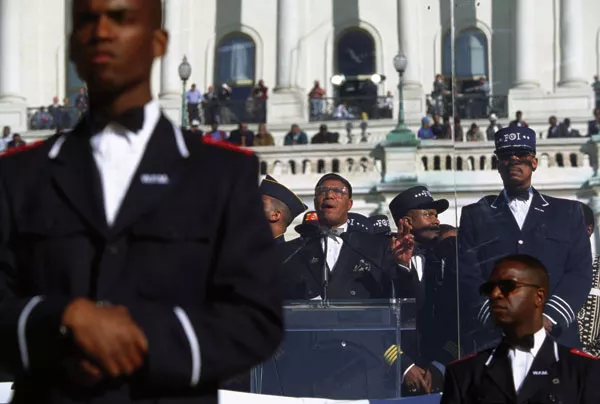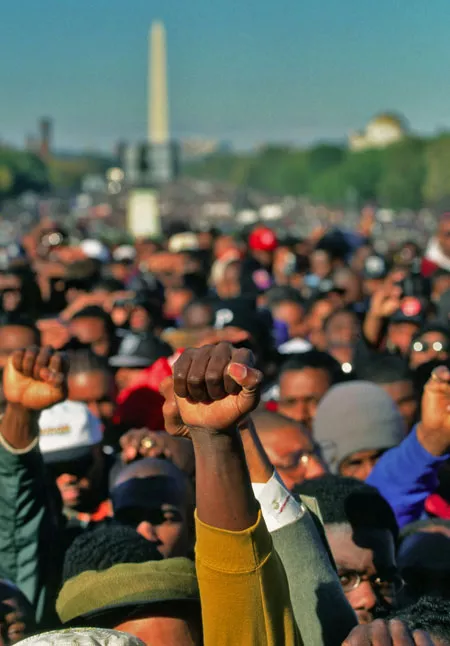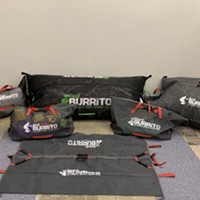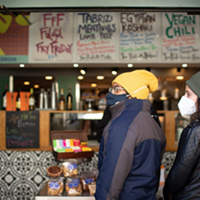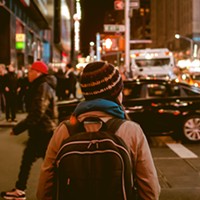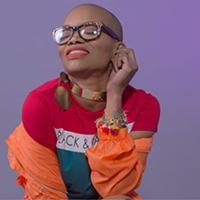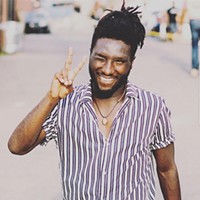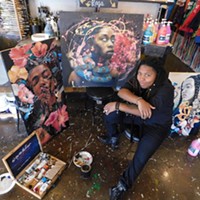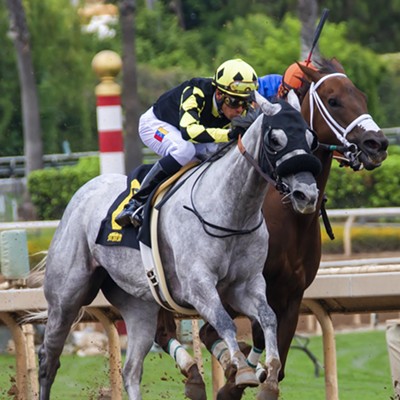Face the 'Nation': Louis Farrakhan
Hate yourself just a little for liking the leader of the Nation of Islam? Don't.
By Emiene Wright @emienewritesIn July, inside the gold and white opulence of Chicago's Mosque Maryam, a man speaks to a sea of fashionably dressed congregants like family. He imitates imagined critics: "They say, 'That Farrakhan is a racist!' Why? 'Well, you talk bad about white people.'" He punctuates his statements with a broad, ironic smile, and the crowd laughs appreciatively. "No, white people's history talks bad about [white people]."
Next Sunday, about 10,000 people are expected to flock to Bojangles' Coliseum to hear that same man, Louis Farrakhan. The leader of the Nation of Islam will be in Charlotte to commemorate the 17th annual National Day of Atonement, held on the anniversary of the Million Man March. As at the 1995 march in Washington, D.C., the majority of attendees will be African American, Christian and well aware of the mainstream view of the keynote speaker: He's a demagogue, a relic from before these "post-racial" times, a man with an affinity for incendiary comments and strange ideas about UFOs and Scientology.
The attendees won't care.
Listening to Farrakhan speak is akin to hearing the best politically incorrect joke. You know you shouldn't laugh, but despite the discomfort, something in the joke resonates. His long history of pointed, confrontational and often witty attacks on America's power structure, media and foreign policy has won fans among the disenfranchised, despite controversial condemnations of Jews and homophobic comments that deflect attention from his central message of African-American empowerment.
But it is this message of empowerment — of investing in one's community and looking out for one another — coupled with Farrakhan's skillful delivery that has bolstered his support among many African Americans, even those who are at odds with him ideologically or who find his personal quirks off-putting. It's what has kept the Nation of Islam — and the man behind it — relevant.
FARRAKHAN'S STORY actually begins three years before he was born, with the founding of the Nation of Islam in Detroit, Mich., in 1930. Wallace D. Fard, a slim, bi-racial man with a scholarly demeanor, arrived in Motown that year from an obscure background, teaching a form of Islam that identified African Americans as the Biblical lost tribe of Israel.
Despite the availability of jobs, early 20th century Detroit held harsh social conditions for blacks. Most had come from Alabama: farm laborers who left behind boll weevils and lynchings for the dream of earning $5 a day at Ford Motor Co. Even though Northerners greeted them with violence and discrimination, Detroit's African-American population swelled 600 percent between 1910 and 1920. Race riots and violence ran rampant in the city.
In this tense environment, hearing they were God's chosen people must have been sweet words to Detroit's black population. Along with believing that African Americans are descendents of the first people on Earth, the Nation of Islam believes God is Allah; the Christian Bible has truth but had been tampered with and must be re-interpreted; African Americans are the chosen people whose suffering was foretold as a prelude to greatness; and adherents should separate from mainstream American culture to avoid God's impending judgment of the wicked. The Nation also advocated rejecting the last names of white families that were imposed upon blacks during slavery, hence common surnames like X and Muhammad.
With the help of Mary Almanza, an African-American teacher, and her Mexican-American husband Henry, Fard established Muhammad's Temple No. 1 in Detroit's "Black Bottom" neighborhood and quickly attracted more than 25,000 members.
Fard disappeared to an unconfirmed fate in 1934, but the Nation continued to revere him as the "Mahdi," or "Savior" in Christian terms. His successor, Elijah Muhammad, took the Nation to new heights, establishing mosques and proselytizing in major urban centers in the Northeast. He also began recruiting among a heretofore untapped population: the incarcerated. Here, Muhammad found a drug-addicted pimp called Detroit Red, the man who transformed himself into Malcolm X and by the 1960s made the Nation of Islam a household name. But after a transformative pilgrimage to Mecca, Islam's holiest city, Malcolm X reversed his opinion on the inherent evil of whites and left the Nation. When X was assassinated in 1965, Farrakhan, another rising star in the Nation, came to prominence.
Originally Louis Eugene Wolcott, Farrakhan grew up in Boston and was a rigorously trained violinist. He completed three years at Winston-Salem Teachers College in North Carolina before recording several calypso albums as "The Charmer." He was performing as "Calypso Gene" in Chicago when he was first exposed to the teachings of Elijah Muhammad.
MEMBERS OF GENERATION X are more familiar with the Farrakhan of the late 1980s and 1990s, when he seemed like one of the most powerful — and dangerous — men in America. It was a turbulent time.
Young, gifted black kids were grappling with the disastrous effects of President Reagan's "Trickle Down" economic policies. Budget cuts gutted Upward Bound and other programs that provided scholastic, artistic and musical outlets for underprivileged youth, leaving a generation of at-risk kids suddenly without much-needed resources. Crack cocaine was ravaging inner cities, which the San Jose Mercury News alleged was part of a scheme the CIA struck to funnel millions to anti-Socialist Contras in Nicaragua. A new plague, AIDS, was felling people with no regard to race or sexual orientation.
Meanwhile, hip-hop was catching fire, moving away from the feel-good party music vibe that characterized early acts to socially conscious themes that spoke to the frustration and powerlessness of the times. In "Rightstarter (Message to a Black Man)," from Public Enemy's 1987 debut album Yo! Bum Rush the Show, Chuck D. raps:
You spend a buck in the '80s what you get is a preacher/Forgivin' this torture of the system that brought 'cha ... Many have forgotten what we came here for / Never knew or had a clue so you're on the floor/Just growin' not knowin' about your past / Now you're lookin' pretty stupid while you're shakin' your ass.
Traditional black leadership rejected hip-hop's language, dress and anti-authoritarian attitude. Calvin O. Butts III, pastor of the historical Abyssinian Baptist Church in Harlem, led a campaign with other black political leaders against hip-hop that culminated in a photo op with him threatening to crush hundreds of CDs with a steamroller.
Meanwhile, Farrakhan unapologetically embraced the youth culture. Accompanied by the Nation's muscled, military-styled Fruit of Islam security force, he went into battle-scarred neighborhoods and began addressing immediate needs, such as health and safety. On Oct. 25, 1989, the District of Columbia approved a resolution extolling the work of Farrakhan and the Nation of Islam for shutting down a drug market at a notorious apartment complex. He received similar acknowledgement the same year in Philadelphia, and numerous other accolades. The brilliance of the Nation's outreach was that it offered programs with tangible and intangible benefits: women's education classes that taught basics like how to plan a family budget, moral encouragement through study of the Koran, and business programs that encouraged entrepreneurs to build companies in their own neighborhoods and employ people who lived in the area.
Self-control and community control are other major planks in the Nation's ideology. "In order to secure our future, we must create jobs for ourselves, do for self and implement a program that allows us to be self-sufficient," Minister Ishmael Muhammad, Farrakhan's national assistant minister, told me. "We don't find any other community in America that continues to struggle for two things, justice and jobs, because they have enough love and respect for self. They pool their resources, whether Hispanic, Asian or European immigrants. In all these communities, you find them working collective economics. They're not looking or begging others to do for them what they feel, see and know they can do for themselves."
By the late '80s, hip-hop artists like Public Enemy and Big Daddy Kane had spread the ideology of the Nation of Islam (and its offshoot, the Five Percent Nation) beyond its strongholds in New York, Boston, Philadelphia and Washington. Kids from Detroit to Denver who had never set foot inside a mosque were talking about knowledge of self, forming ciphers and steadfastly avoiding pork.
While Farrakhan's undeniable swagger in media confrontations mirrored the anti-authoritarian ethos of hip-hop, his penchant for making the most politically incorrect statements imaginable was cause for alarm. In an appearance at Michigan State University on Feb. 18, 1990, he accused Jews of "sucking the blood of the black community." He also attacked Jews for abusing their leadership positions in pop culture industries to produce movies and books that made black people look like "clowns and buffoons," and excoriated them for the role some Jews held as ship owners in the Trans-Atlantic slave trade.
Mainstream media reaction was swift and condemning. Nathan Perlmutter, former head of the human rights organization Anti-Defamation League, and Village Voice writer Nat Hentoff characterized Farrakhan as a "Black Hitler." Jesse Jackson and other leaders, who had previously spoken at events alongside Farrakhan, pulled back on joint appearances. Meanwhile, incidences of violent crime and police brutality were pushing urban centers to the edge. Most notably, the acquittal of four LAPD officers videotaped in a brutal beating of motorist Rodney King sparked riots in Los Angeles and national demonstrations. Malice Green's death at the hands of Detroit police in 1995 also garnered major media attention.
In this environment of desperation, the Nation of Islam executed the Million Man March, on Oct. 16, 1995, in Washington, D.C. Farrakhan called it a Day of Atonement, a chance for black men to come together and examine themselves with the intention of reversing widespread failures of leadership, fatherhood and husbanding in the black community. The National Parks Service reported attendance at 400,000 but was accused of undercounting; Boston University and other sources estimated between 700,000 to just over a million marchers. A handful of arrests, in the single digits, were made, an extraordinarily low number for a crowd of that size. Most were for unauthorized vending.
Unlike the 1963 March on Washington during the Civil Rights movement, or other historical events of similar scale, the overwhelmingly black male crowd was not demanding anything of the government, nor were the demonstrators protesting any policies. "It was an event for us to reflect on our own behavior, how we have committed atrocities on each other, neglected our families, and atone," says Brother Kaz Muhammad, of Charlotte's Muhammad Mosque No. 36. He was fresh out of college and a Christian when he attended the first Million Man March. "Like everyone else, I didn't know what in the world I was walking into, but I knew something had to be done with the situation of black men in America." According to the Nation of Islam, more than 85 percent of participants were Christian. Myriad civic organizations, fraternities and even street gangs were represented.
"Today we ask nothing of the government, and everything of ourselves," then-Baltimore Mayor Kurt Schmoke told the crowd.
In perhaps the most pivotal portion of the event, Farrakhan exhorted attendees to return to their homes and join volunteer or religious organizations to rebuild their communities. That critical factor, putting action behind words, is one of the main points that made the march so effective and the reason it has been renewed each year thereafter.
KAZ MUHAMMAD was instrumental in bringing the event to Charlotte this year. As a member of the Holy Day of Atonement Charlotte host committee, he is confident the event will have a positive economic and cultural impact on the city. The committee expects up to 10,000 visitors to Charlotte for the weekend, he says, with the concentration of people coming in from the East Coast, but sizable groups coming from California, Texas, the Caribbean (where the Nation has a sizable membership), Toronto and the U.K. Calls to most Uptown hotels reveal almost solid booking for the weekend. Dozens of room blocks reserved under the group code are completely sold out, a signal that the economic boon to Charlotte's airport, hotels and restaurants will be great.
But organizers of the event hope to downplay Farrakhan's polarizing side. WGIV morning drive DJ and host committee member B.J. Murphy dismisses as "absolutely untrue" the charges of anti-Semitism against Farrakhan. "If he was a bad person, why would two million [sic] men come to D.C.? Why would people support and love him like they do? That's insulting our intelligence."
Other Charlotte entities involved in executing the Day of Atonement include Masjid Ash-Shaheed, Greater Providence Baptist Church and a number of smaller organizations. The Rev. Dwayne Walker of Little Rock AME Zion Church chairs the host committee. Despite the effort at interfaith outreach, and the exhortation that everyone is welcome, no synagogues or Jewish organizations are involved in the event.
Abran Abraham Moore, 32, of Salisbury, finds that suspect. "If your religion is known to have a problem with Jews, it doesn't bode well for your interfaith outreach not to extend that olive branch to Jews. Then you're making a decision based on your religious prejudices. People will put two and two together."
Moore, a self-described "Un-Orthodox Jew," says he has no real problem with the Nation of Islam. "For any religion, there are extremists who take things to a disagreeable limit. But my friends in college were no different from you or me, as far as dress or behavior. To me, it's no different from people growing up in a strict form of Judaism. The Nation of Islam serves a purpose for black youth and black people."
Farrakhan appears to be making a special effort to engage more people lately, and he's using a gentler approach than years back. The flier advertising this year's National Day of Atonement shows him with hands clasped, wearing a pale suit offset with a lavender bowtie and a part in his wavy, still-black hair. It's a more charming, less fiery image that might frequently run in The Final Call, the Nation's newspaper. And he hosted his first-ever Twitter town hall meeting a few weeks ago, with thousands of mostly young attendees, for almost two hours. Under the hashtag #AskFarrakhan, moderators selected mostly warm, fuzzy questions seeking Farrakhan's advice or predictions, with the exception of one subject: Scientology.
Since about 2010, Farrakhan's been promoting the readings of L. Ron Hubbard, the founder of Scientology, and the use of dianetics, a philosophical system Hubbard invented aimed at ridding the mind of fears and past trauma. He's gone so far as to require Nation ministers to submit to auditing, the dianetic process of delving into practitioners' subconscious to release bad memories.
During the live-streamed meeting, a woman named Lorraine Graves tweeted, "It was strange that the Nation of Islam is using dianetics," before asking: "How has it benefitted your followers?" and "Do you think the Black community would be open to it?"
Farrakhan has previously discussed his attraction to Scientology, which has a history of recruiting high-profile followers including Tom Cruise, John Travolta and singer Beck. He summed up his position in his response to Graves: "You know, I found something that I felt would be helpful. A lot of Muslims that are in the mosque, male and female — we function well. But there are impediments because of things that happened in our lives when we were young," such as child abuse and other traumas that affect subconscious behavior. Farrakhan said he thinks dianetics is "a tool that I can use to help our people."
Farrakhan has endured scrutiny in the past for several unusual ideas, including conspiracy theories about the "Mother Plane — white people call them UFO's," which he calls the "wheel within the wheel" predicted in Ezekiel 1:16, and which he believes will be instrumental in saving the righteous on Judgment Day.
It's another piece of the complex puzzle that is Farrakhan, one of the strangest yet most compelling political figures of the century. Ridiculous or not, his very idiosyncrasies have furthered the presence of the Nation and, in turn, pushed the agenda of the cause he has dedicated himself to. But does that justify his flaws? "I don't think it overwrites his flaws, but his works show a bigger picture of who Farrakhan is," Kymberley Morgan, a 34-year-old executive assistant, said.
You can come to your own conclusions this Sunday.
Speaking of...
Latest in Cover
More by Emiene Wright
Calendar
-

Wine & Paint @ Blackfinn Ameripub- Ballantyne
-

Face to Face Foundation Gala @ The Revelry North End
-
An Evening With Phil Rosenthal Of "Somebody Feed Phil" @ Knight Theater
-
Kountry Wayne: The King Of Hearts Tour @ Ovens Auditorium
-

Queen Charlotte Fair @ Route 29 Pavilion
-
Canuck in the Queen City 7
A Canadian transplant looks back at her first year as a Charlotte resident
-
Homer's night on the town 41
If you drank a shot with the Knights mascot on Sept. 20, you were basically harboring a fugitive
-
Delic Holdings Inc. Announces Meet DELIC, the Premiere Psychedelic and Wellness Edutainment Event and Expo for Newcomers and Veteran Psychonauts, Announces Initial Speaker Lineup 42

